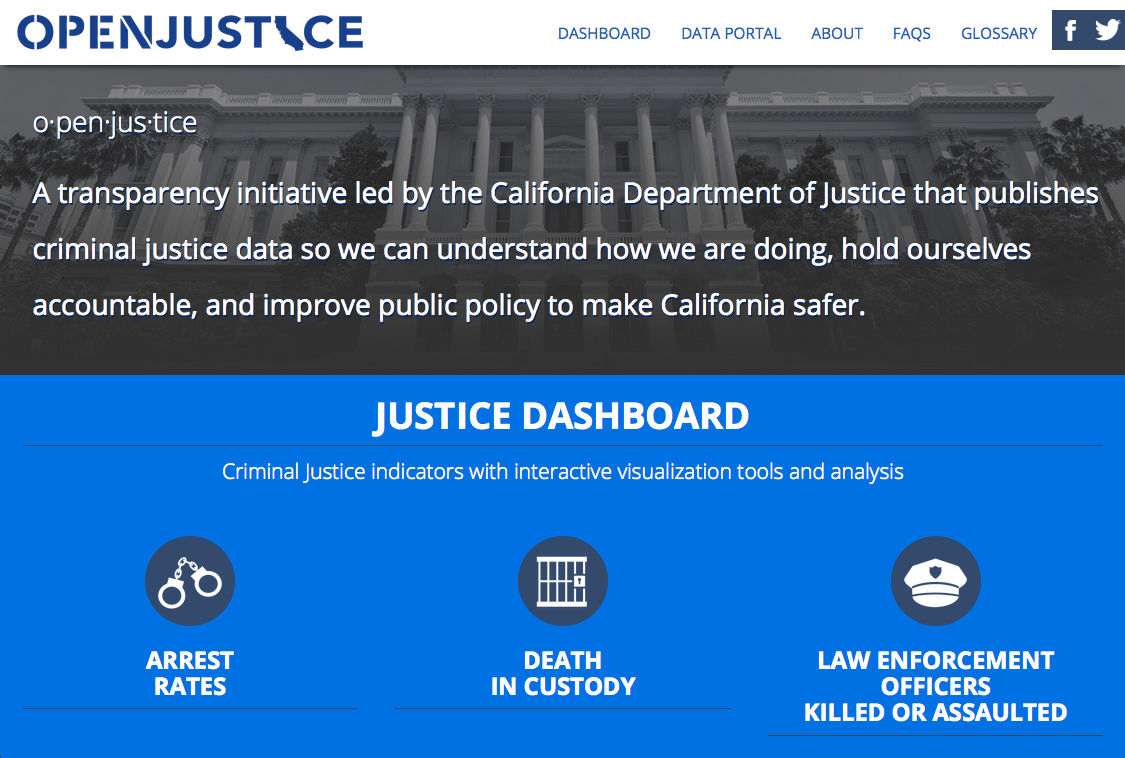I was excited to discover the OpenJustice Initiative, a move from the California DOJ to make its data more open, and provide a basis for more usable tools, interfaces, and processes for people who interact with the DOJ. See it in action: State of California Department of Justice – OpenJustice
OpenJustice is a transparency initiative led by the California Department of Justice that publishes criminal justice data so we can understand how we are doing, hold ourselves accountable, and improve public policy to make California safer.
It launched this year & has several data sets already available, on arrest rates, deaths in custody, and law enforcement officers killed/assaulted.
It’s great to see the justice system open up their data (if not also their processes) so that others outside the government can build better tools, interfaces, and intelligence on top of it.
This is the vision I have for how we get better access to justice & more usable government/court systems: these systems must structure, coordinate, and open their information up, and let non-governmental bodies who specialize in design & development figure out how best to make it understandable & usable.
Here is the POV of OpenJustice:
OpenJustice is a data-driven initiative that embraces transparency to strengthen trust, enhance government accountability, and improve public policy in the criminal justice system. Recent events in California and across the nation have highlighted the need for an important conversation between law enforcement and the communities we are sworn to protect. It is important that part of it be in a universal language — numbers.
OpenJustice advances Attorney General Kamala D. Harris’s “Smart on Crime” vision by leveraging statistical data maintained by the California Department of Justice (CA DOJ) and other publicly available datasets. OpenJustice includes three major components:
- A Justice Dashboard that spotlights key criminal justice indicators with in-depth analysis, integration of other publicly available datasets, and user-friendly interactive visualization tools;
- An Open Data Portal that publishes data from CA DOJ’s statewide repository of criminal justice datasets in an open-source and downloadable form; and
- An ongoing effort to improve criminal justice reporting in California.
OpenJustice underscores the CA DOJ’s commitment to improving public safety and increasing transparency through innovation; it represents one of the largest open government criminal justice data initiatives of any state in the U.S.
In the coming months, OpenJustice will expand to include more dashboard metrics across the justice system and a broader array of datasets and take steps to improve criminal justice reporting in California. Building safer communities requires trust and data-driven criminal justice policy. This starts with transparency.
OpenJustice Principles
As OpenJustice moves forward, these are our guiding principles:
- Proactive transparency
- Release information online that increases civic engagement and government accountability
- Adopt a presumption in favor of openness unless the data is designated as protected or sensitive
- Prioritize the publication of high-value datasets
- Privacy and sensitive information safeguards
- Comply with all regulations and laws regarding privacy and disclosure of personally identifiable information
- Limit the publication of personally identifiable information to that which is both legally authorized and relevant so as to minimize the risk of inappropriate identification and to protect the privacy rights of individuals (living or deceased)
- Take into account the foreseeable consequences and privacy implications of releasing any de-identified data, including the risk of the “mosaic effect” of data aggregation
- Inclusivity
- Incorporate public perspectives into open data policy
- Explore potential partnerships to leverage the impact of open data
- Broad accessibility
- Provide all data license-free
- Publish in open standards (e.g. CSV), in machine-readable formats (with a preference for machine-processable), and open-source
- Create public Application Programming Interfaces (APIs) for accessing information
- Data quality
- Develop processes to improve data quality and reporting





3 Comments
[…] Sourced through Scoop.it from: http://www.openlawlab.com […]
Your vision is very powerful and inspiring. But there’s just one thing I’d change – we can’t start with the systems changing themselves, especially when we are talking about thousands of municipal courts. We need to start with a non-governmental body or bodies who can provide the structure to coordinate the open data about the law, like the data found in court dockets.
All we need for that is to have a for-profit or not-for-profit company who is dedicated to open source dockets to out-compete the third party vendors who currently provide online dockets for courts. Looking at the quality of the online dockets and court budgets make me think that can’t be an impossible thing to do. Especially if we had loud support from leaders in legal services.
Or it could be done by the current leaders of legal tech. A comment at the ABA Summit that I thought was hugely important but seemed to be ignored – did John Suh of LegalZoom say that they could work on online dockets for municipal courts in one of the last panels on Monday? If LegalZoom supported a foundation for open-source online dockets, that would greatly benefit LegalZoom (opening up a huge market without giving them a monopoly), court administrators, and all of us.
[…] Her vision for access to justice is inspirational. […]